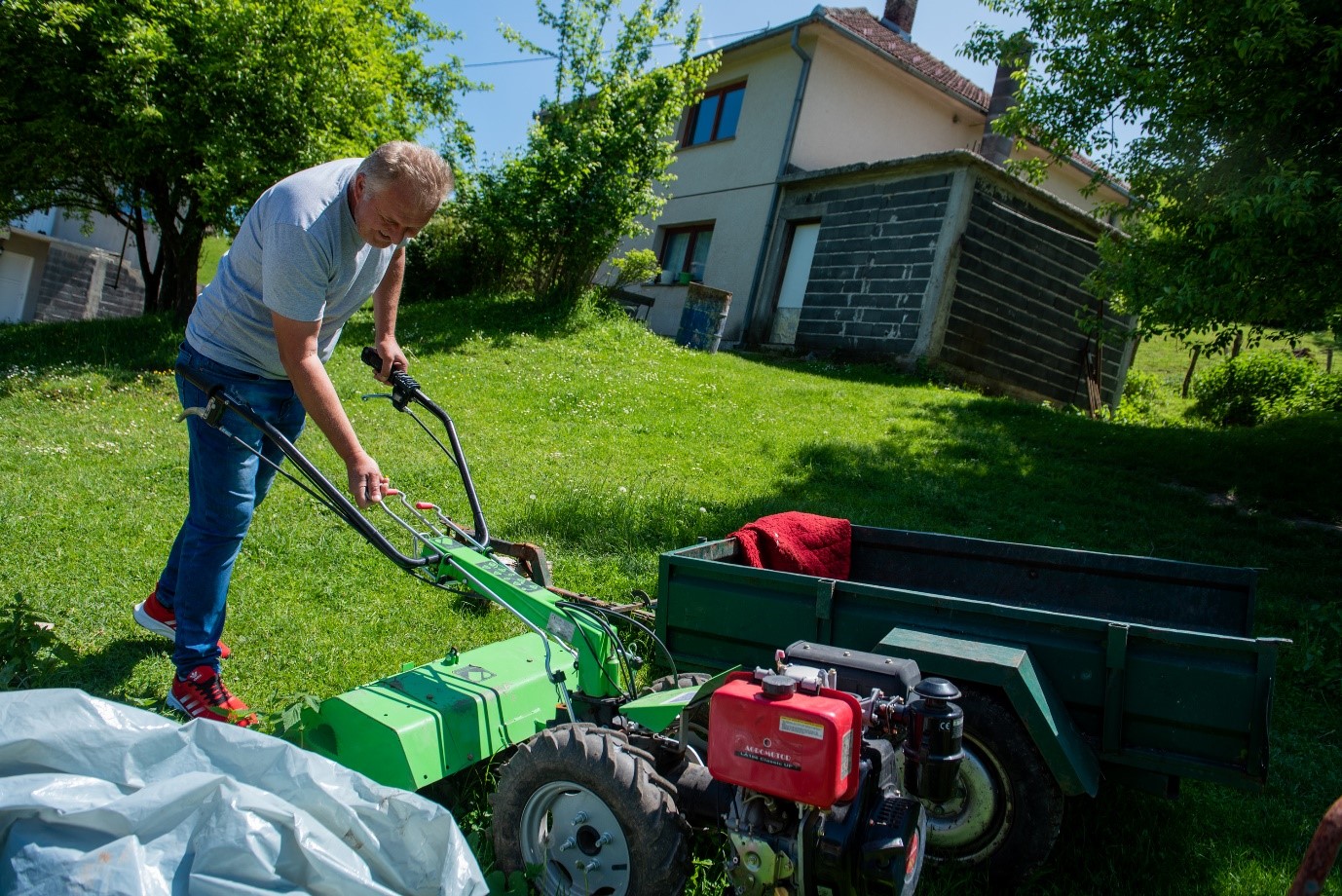After the family home collapsed due to the 2014 landslide, the Karajbić family is finally preparing to move into a new home.
Attending to about twenty sheep, chickens, turkeys in summer and autumn, springtime on a field planted with onions, lettuce, potatoes, beans, cucumbers, tomatoes and corn, or in other words, full hands for 51-year-old Vahidin Karajbić from the village of Mustajbašići in Zavidovići. Cultivating the land and raising livestock and poultry provides healthy food for his family. Any extras that he manages to sell and the disability pension earned while working in Slovenia, enable him to live in the village where he grew up.
The Karajbić family is finally getting ready to move into a new home this spring, after living with relatives in the neighbourhood for the past six years because the walls of their family home cracked under the weight of landslides, following heavy rains that hit Bosnia and Herzegovina in 2014.
New home
On the banks of the Krivaja River and at the foot of the Klek mountain, across the old family home, a new home was built for Vahidin, his wife, mother, son and daughter as part of the Flood Recovery – Housing Interventions Programme financed by the European Union, and the Entity governments and local authorities.
The Karajbić family is looking forward to moving in and, as much as they can, they are buying furniture and equipping the home to live in. Although the home they had to move out stands as an abandoned monument to all those who grew up in it, Vahidin says that they are satisfied and happy that they will finally settle “in their own home”, after years of living under someone else’s roof.
Although he inherited the land he cultivates, Vahidin Karajbić could not afford to build a new home. When he found out about the possibility of a donation and received assurances, he did not think twice about where he wanted to live. Surrounded by brothers and on his own land, he is now even more determined to keep his children in the countryside.
“It’s nice here, there’s not much traffic, Krivaja is here. The most important thing is that it is peaceful”, Karajbić describes his village. “You don’t need a fortune to live, but some normal life. And everyone else is here.”
Cracked walls
The old family home still carries remnants of former life, few personal belongings and old furniture. Cracks in the walls and dents in the floors are telling that it is unsafe to stay in a home where five sons and three daughters of Vahidin’s parents grew up, but also where his children grew up.
“From time to time, they will all ask for a key, to go in, see a bit. Especially when the children come”, says Karajbić and adds that he does not come in often. If he does, he stays there briefly only, to get whatever it is that he needs and goes about his work.
He explains all the findings and tests done so far: the surrounding hills are rich in groundwater, so it is not difficult to find a source or guess the place for a well. However, the wealth of water did not end well for his former home – heavy rains started the landslide next to the house, which did not withstand the force. From May 2014, it started giving signs that it was not safe. Subsequent assessments also showed that recovery would not pay off.
“The walls are cracking even now,” he says, adding that whenever he enters an old house, he sees a new crack. He never saw or heard of natural disaster of such scale, at least not until 2014. Or as he describes the surrounding hills and fields, “Water is always there. Everyone had tapped on the water supply, and still there is extra”.
Heavy rains that hit Bosnia and Herzegovina in May 2014 caused the levels of the rivers Bosna, Drina, Una, Sava and Vrbas to rise, resulting in catastrophic floods and landslides, with damages for one million, forcing about 90,000 to flee their homes. Settlements in the hilly parts were also damaged due to excessive rainfall and groundwater surge, which triggered unstable land.
Through the Flood Recovery Programme, the European Union has provided housing for about 3,000 in 45 municipalities and cities in BiH in the last four years. A total of 423 new homes were built and 600 housing units were rehabilitated, while 213 families received economic empowerment packages in the field of agriculture.
The Programme is worth 15 million euro, and it is financed by the European Union in cooperation with the Government of the Federation of Bosnia and Herzegovina, the Government of Republika Srpska and local authorities. It was implemented by UNDP in BiH jointly with the International Organization for Migration (IOM), Arbeiter-Samariter-Bund (ASB), Hilfswerk International (HWI) and partner municipalities and cities.
Beneficiaries of this Programme were selected through a public call, and assistance was primarily given to socially and economically vulnerable groups, such as the elderly, low-income households and internally displaced persons. The Karajbić family is one of those who got a new home. In support of farming, they also received a milling machine, which greatly helps Vahidin’s job of cultivating the land.
“I was given a motor cultivator and a milling machine. I got myself a trailer. Now I take a trailer, mow the grass, cut it for myself, then for my daughters-in-law, and earn something,” he says. “I work with a neighbour. I plough for others too, my brothers, and they give me 10 to 15 BAM, and it’s welcomed. I don’t mind doing anything.”
As with other facilities built under this assistance programme, the home of the Karajbić family was built with energy efficiency measures, which will allow for rational use of energy and significantly reduce the cost of utilities

